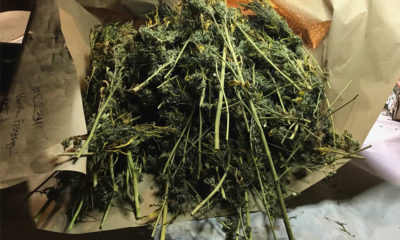
Cultivation
Face of the Farmer: Sunshine Cereceda, Sunboldt Grown
By cutting out the middleman and smartly branding the farm and its product, Humboldt County cannabis farmer Sunshine Cereceda wants to change the industry from within.
Stepping out of the unregulated medical marijuana market in California and into the world of legal, adult-use cannabis, with licensing and high taxes to follow, has been no small feat for most farmers in Northern California’s hail from the Emerald Triangle, which includes Mendocino, Humboldt and Trinity counties. Considered by many as the cannabis capital of the world, this is where many of the cultivars we enjoy were first developed.
One such Southern Humboldt County farmer, Sunboldt Grown owner Sunshine Cereceda, was comfortable in the medical marijuana space, using the cooperative model where patients supported farmers. There, she developed and branded cultivars of her own, like Loopy Fruit, Wanderlust, Delphina and Redwood Summer.
Cereceda saw the writing on the wall with issues of legalization for the small farmers to the north, and her message is the still the same: Farmers need to brand themselves, their farms and their cultivars in order to effectively compete and be known.
They also need to do away with the middleman—or the “Bro Distro”—as Cereceda dubbed them. This refers to the old-school method of moving material and product on just a handshake, with the small farmer at home often getting the short end of the deal. It worked to a point back in the day, but today trust is being exploited by what she calls “corporate sharks.”
“Cannabis has always sustained us, even through the hard times, so why is it not going to get us through now, after all these years?” Cereceda asks. “In my mind, the small cannabis farmers need to change their mindset. They need to do away with all the bad habits developed in the past unregulated markets in order to move forward.”
Cereceda went on to explain that in the days of prohibition, they were functioning without a future. But now, small cannabis farmers can leverage their own history as they legally build their businesses.
“Rookies and bad habits built the industry during prohibition. From my roots in activism, I understand the challenges of the messenger,” she said. “But we have this product that’s already branded from our region—we’re known as rockstars in the industry. There’s no stronger cannabis community in the nation. We’re just in transition. It’s a learning curve, to say the least.”
Born Into Activism
Sunshine Cereceda’s mom brought her to Southern Humboldt from her birthplace of San Luis Obispo, CA, when she was seven years old.
“I was raised by an activist,” Cereceda says. “My mother organized and protested nuclear energy and weapons. She was there during the Diablo Canyon rally in 1978 with [CA Governor] Jerry Brown—she was one of the organizers.”
Part of her mother’s advocacy included protecting the redwoods, and Cereceda followed in her footsteps, majoring in geology at Humboldt State University. “I studied geology mostly because it’s Mother Earth, and I wanted to understand the earth” she said. “I thought it was all about plant life, but then I realized it was the rocks and the earth itself.”
The degree led her to work on road inventories for Humboldt Redwoods State Parks, followed by a gig with Pacific Watershed Associates.
Watershed stewardship is an important issue in California and is directly tied to the health of the forests and rivers. For decades, the watershed was largely ignored by small and large-scale cannabis operations from both the unregulated medical and illicit markets during the days of the Green Rush. They would reroute water coming down the mountains to suit their needs, with unpermitted roads crisscrossing the hills, making it nearly impossible for literally hundreds of hill farmers to come into compliance today.
It’s important to note that the erosion of the roads is also a direct result from the timber industry, now expected to be corrected and paid for by the farmers.
“During a town hall meeting prior to legalization, water experts were brought in to let us know that, even in a drought, we could gather enough water to care for our crops using rain-catchment systems,” she said. “Cannabis farmers have taken the lead in responsible water use for agriculture in the state.”

For the Love of Farming
Responsible agricultural practices are key in sustainable and regenerative farming, which is what the Emerald Triangle is known for. But it’s not enough to compete in an overregulated market, where the farmer feels the brunt of taxation—not only on the farm, but also on the shelf, as retailers bump their losses down to the farmer at check-out.
“Farmers are at the end of the line in a capitalistic system, and we carry the tax burden as it gets kicked down from retailers and brands that buy bulk and package it themselves,” Cereceda says. “I’m lucky that I have good retail partners, but that took time and consistency to establish. If you’re still using your Bro Distro, you’re losing a big chunk of income.”
With the promise of distributors and umbrella brands representing farmers a clear disappointment—garnering a mere $400 to $500 per pound—Cereceda says it’s time for farmers to represent themselves in the marketplace and build a brand.
Doing all the work herself with her team, from seed to shelf, including packaging, Cereceda said she’s been able to get $1100 to $1200 per pound.
“Farm management skills [and] managing workers—it takes a lot of years and a concentrated effort to be good at it, and that all adds to your bottom line” she says. “You can’t just get a license and think it’s all going to work out alright with your output. Historically, we pay for our operation out of each harvest, but that’s like working paycheck to paycheck with no guarantee your next crop will be moved. Our distribution right now is weak.”
Reducing risk plays a big factor in succeeding in the regulated market, and Cereceda says the more a farmer opts out of their own work, the less they’ll make. It’s just common sense.
“How about growing what you can move yourself?” she asks. “This is capitalism, count your blessings. This is how it works. The middleman will take all your profits if you let him. And your Bro Distro isn’t much better. It takes one year to grow a crop; it takes several years to grow a business.”
One distributor Cereceda speaks fondly of is Berner, CEO and co-founder of Cookies, with longtime Southern Humboldt Farmer, Kevin Jodrey in the mix.
“Berner is underrated,” she says. “He’s doing a great job supporting farmers and has gotten more customers off the black market on the streets and into shops than anyone else. He allowed so many black-market growers back in the day to prosper growing his genetics—they got brand recognition for his cultivars. Can’t say enough good about Berner.”
Berner is a stage name for San Francisco Bay Area hip-hop artist, Gilbert Anthony Milam, Jr., who branded his Cookies cultivar during the medical market in California. Cookies was made legendary after the Scouts of America forced him to shorten the name from Girl Scout Cookies to Cookies.
Branding a Life

Showing the face of the farmer—telling their stories in today’s social media marketing mindset is everything.
The once shy Cereceda is now posting photos of herself on social media from the farm, holding her colas in the forest, telling the stories of how they were created and named—sharing her charmed farm life with the world.
Typically, it takes years to create a cultivar. It’s not uncommon for each farmer to have specific stories surrounding the work, the detailed variations of the flower, and the cultivar’s name, which often involves a sentimental or meaningful story from the farm.
Sunboldt Grown’s website beckons, “Taste the Redwoods,” noting all cultivars are grown in the loamy ancient soil, taking on nuances, just as in viticulture in the South of France and the growing of grapes for wine taking on the essence of lavender or rosemary nearby.
The plants are grown in the flood plain deposits of the Eel River, with no additional water needed. This is called dry farming, and the farmers refer to themselves as “terroirists” (from the French word terroir, meaning earth or soil), who allow for the place to be expressed in the flower they grow.
Cereceda’s crops are also grown by the cycles of the moon, not uncommon among farmers. In fact, the historic Farmer’s Almanac still provides lunar cycles as a planting guide. The almanac explains that just as the moon’s gravitational pull creates the tides of the oceans, it also promotes plant growth by creating more moisture in the soil.

“Wanderlust was inspired by sailing on the ocean,” Cereceda says. “The word implies an urgency to be moving, to not settle in one place.”
From its website, Wanderlust is a hybrid of Blue Dream and Agent Orange, with flavors of lemon-lime zest and fresh Douglas Fir needles, finishing with a splash of orange juice. The smoke is medium-bodied with a dense, velvety richness. A ten-week strain, its delicate flower is sensitive to the cold.
“Redwood Summer is named after the 1990 campaign and initiative to stop the clear-cutting of all old-growth redwoods,” Cereceda said.
The backstory of the Redwood Summer campaign is heartbreaking and personal to the region. Earth First! began the movement. It was led by Judi Bari during the Timber Wars, which continued into the 1990s and ended when Bari and her partner Daryl Cherney were seriously injured after a pipe bomb was planted in their car. The cultivar is a tribute to Bari and the movement that continues to educate and protect the old-growth forests.
Delphina was created by crossing Purple Nepal with Rebel Moon (NorCal Diesel). Cereceda uses this cultivar to make old-school, solventless, bubble hash as it yields high-quality resin. A sweet and savory aroma, it’s spicy, and the smoke is likened to breathing in the forest floor, delivering a deep state of relaxation and euphoria.
“Delphina is a Greek woman from Delphi, Greece, where the Earth Goddess Gaia was first celebrated,” she said.
According to author Darian West, the Oracle of Delphi was considered the most influential woman of the ancient world from 800 BC until 393 AD, when her last recorded entry predicted the end of the Roman Empire, declaring, “All is ended.” Delphina proclaimed Socrates the wisest man in the world, predicted the rise of Alexander the Great and foretold the death of Nero.
Farmer as Influencer
Small cannabis farmers have a hard time getting out of the illicit market. For the most part, they can’t afford licensing, can’t move products, distribution is weak, taxes are high, and ordinances are unreasonable and/or ill-informed to begin with, causing undue hardships.
“Everyone is codependent in this space,” Cereceda says. “The handshake deals don’t work anymore. The days of your best buddy distributing for you are over.”
For the first time in history, cannabis farmers are feeling the brunt of growing the world’s most illicit and beloved herb on the planet. Just as with food farmers, they aren’t getting a living wage, with no subsidy from the US government to bail them out when times are hard, or the price per pound is too low to pay the bills.
“Everyone is borrowing on us, and we’ve been way too complacent about it for far too long,”’ Cereceda says. “On the other hand, this product—this cash crop—is from Mother Earth, and the fact that we’re doing as well as we are up here is just amazing to me. We need to own our right to be here and work smarter.”

















